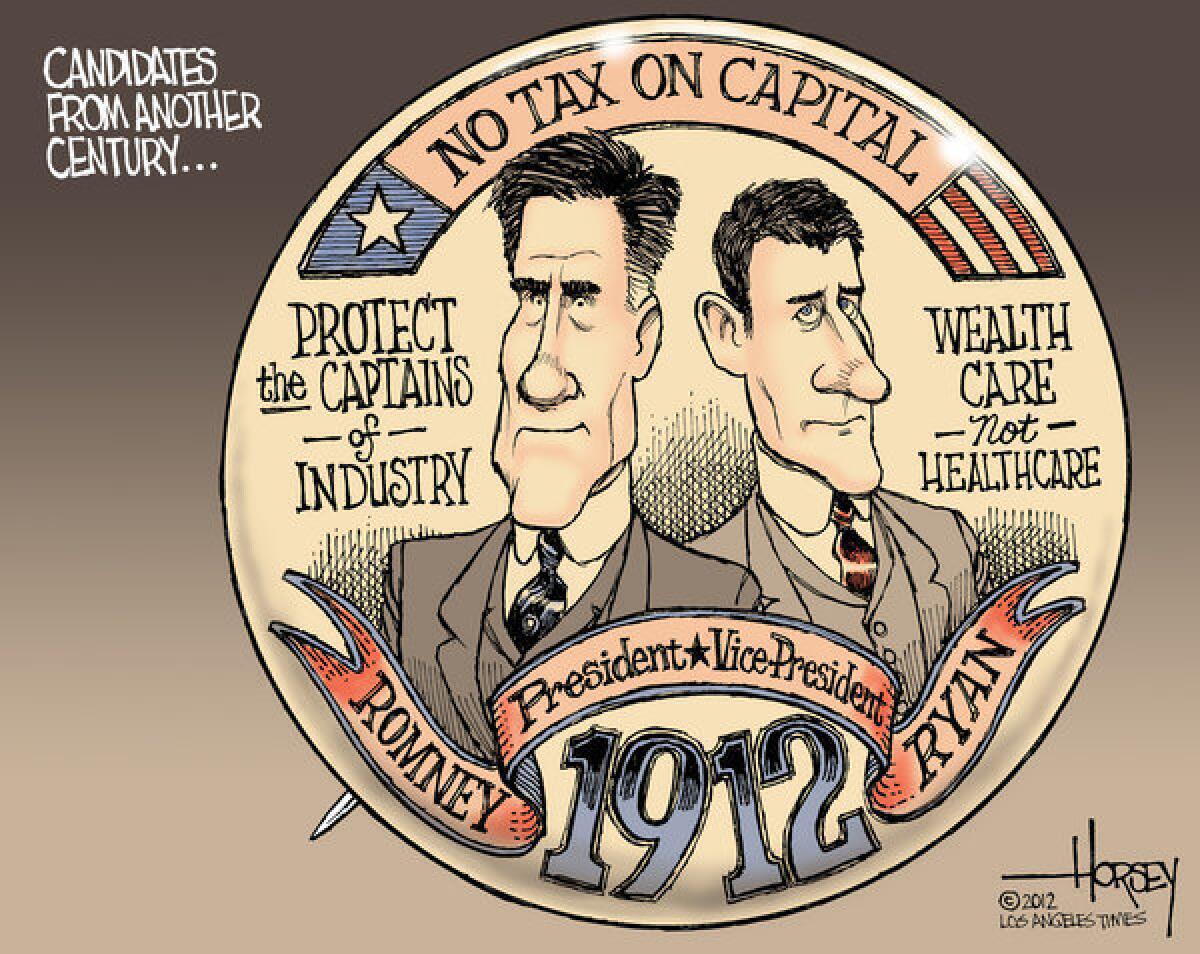Mitt Romney-Paul Ryan vision harks back to the days of Taft

- Share via
The Republican team of Mitt Romney and Paul D. Ryan is less about the future than it is about nostalgia for a past that many Americans imagine was better -- a time when businessmen were free of government meddling and all citizens, even the poor, old or handicapped, were expected to fend for themselves or scrape by on charity.
From the election of Franklin Delano Roosevelt in 1932 until the election of Ronald Reagan in 1980, a different, liberal ethic drove our politics, even during the Republican administrations of Eisenhower, Nixon and Ford. That ethic said government must provide a safety net for the less fortunate among us and set limits on business interests that foul the environment, exploit workers and bamboozle consumers.
With Reagan, the old conservative ethic regained ascendancy, in part due to the excesses and failings of well-intentioned liberal programs. This ethic said government had intruded too much in the economy and had coddled unproductive citizens at the expense of those who worked hard and carried their own weight. Even Democrat Bill Clinton bowed to this new dominant ethic when he signed into law measures that stiffened welfare requirements and eliminated restraints on banks and other financial institutions.
Now, with the political pendulum stuck between the contending philosophies of right and left, the 2012 election offers voters a stark choice between the classic liberalism of the Obama administration and the militant conservatism of the Republican “young guns” in the House of Representatives. With one of the most prominent of those young guns, Paul D. Ryan, tapped as Romney’s choice for vice president, it is clear the Republican Party wants more than a restoration of the compromising conservatism of Reagan. The GOP seeks a return to the good old days of McKinley and Taft.
The budget plans that Ryan has put forward as chairman of the House Budget Committee would underfund or seriously alter nearly every liberal program instituted since FDR’s New Deal. His schemes would also lower taxes on the rich to a level not seen since the 1920s while whittling away at the deductions for home mortgages and philanthropic giving that have helped the middle class. In 2010, he proposed a complete elimination of the capital gains tax, a step that would allow people who live off their investments -- people such as Mitt and Ann Romney -- to pay no taxes at all.
The America Ryan longs for seems more like 1912 than 2012. Certainly, it was a simpler time a century ago. The majority of Americans were white, God-fearing Protestants who lived on farms or in small towns. Only a tiny elite went to college. The rich were very rich while the broad working class earned modest incomes through long days of labor in mines, in factories and in the fields. Women stayed at home. Black Americans were kept in their place. Politicians were in the pockets of the wealthy. Only wild-eyed socialists dreamed of helping the elderly with government-provided pensions and medical care.
Over the last 100 years, the planks of the Socialist Party platform of 1912 -- items like a 40-hour work week, a minimum wage, and precursors to Social Security and Medicare -- became mainstream ideas and pillars of American life. During the liberal era, a huge middle class was created as the American economy became the most vibrant and innovative in the world. The income gap between the rich and everyone else narrowed. A college education became the norm. Most people moved to the cities or suburbs. Women left home and went to work. The U.S. became a more equal, multi-racial society.
The core question before voters in this campaign season is which ethic -- conservative or liberal -- will guide our society in this new century. A lot of the folks supporting the Romney-Ryan ticket are shouting that they want to take their country back, but back to what?
Can a 21st century nation thrive with a return to the policies of William Howard Taft?
More to Read
A cure for the common opinion
Get thought-provoking perspectives with our weekly newsletter.
You may occasionally receive promotional content from the Los Angeles Times.







